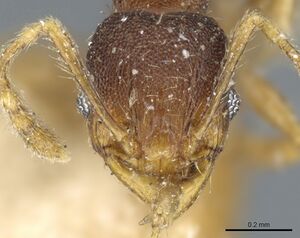Pheidole sagei
| Pheidole sagei | |
|---|---|

| |
| Scientific classification | |
| Kingdom: | Animalia |
| Phylum: | Arthropoda |
| Class: | Insecta |
| Order: | Hymenoptera |
| Family: | Formicidae |
| Subfamily: | Myrmicinae |
| Tribe: | Attini |
| Genus: | Pheidole |
| Species: | P. sagei |
| Binomial name | |
| Pheidole sagei Forel, 1902 | |
Identification
Distribution
Latitudinal Distribution Pattern
Latitudinal Range: 33.90778° to 21.85766667°.
| North Temperate |
North Subtropical |
Tropical | South Subtropical |
South Temperate |
- Source: AntMaps
Distribution based on Regional Taxon Lists
Oriental Region: India (type locality), Nepal, Pakistan.
Palaearctic Region: China.
Distribution based on AntMaps
Distribution based on AntWeb specimens
Check data from AntWeb
Countries Occupied
| Number of countries occupied by this species based on AntWiki Regional Taxon Lists. In general, fewer countries occupied indicates a narrower range, while more countries indicates a more widespread species. |

|
Estimated Abundance
| Relative abundance based on number of AntMaps records per species (this species within the purple bar). Fewer records (to the left) indicates a less abundant/encountered species while more records (to the right) indicates more abundant/encountered species. |

|
Biology
Castes
Images from AntWeb
   
| |
| Syntype of Pheidole sagei. Worker. Specimen code casent0904262. Photographer Z. Lieberman, uploaded by California Academy of Sciences. | Owned by MSNG, Genoa, Italy. |
   
| |
| Syntype of Pheidole sagei. Worker (major/soldier). Specimen code casent0907995. Photographer Will Ericson, uploaded by California Academy of Sciences. | Owned by MHNG, Geneva, Switzerland. |
   
| |
| Syntype of Pheidole sagei. Worker. Specimen code casent0907996. Photographer Will Ericson, uploaded by California Academy of Sciences. | Owned by MHNG, Geneva, Switzerland. |
Nomenclature
The following information is derived from Barry Bolton's Online Catalogue of the Ants of the World.
- sagei. Pheidole sagei Forel, 1902c: 174 (s.), 192 (w.) INDIA. [Also described as new by Forel, 1902f: 542.]
Description
References
- Forel, A. 1902c. Myrmicinae nouveaux de l'Inde et de Ceylan. Rev. Suisse Zool. 10: 165-249 (page 174, 192, soldier described, worker described)
- Forel, A. 1902j. Fourmis nouvelles d'Australie. Rev. Suisse Zool. 10: 405-548 (page 542, also described as new)
- Rasheed, M.T., Bodlah, I., Fareen, A.G., Wachkoo, A.A., Huang, X., Akbar, S.A. 2019. A checklist of ants (Hymenoptera: Formicidae) in Pakistan. Sociobiology 66(3), 426-439 (doi:10.13102/sociobiology.v66i3.4330).
- Rasheed, S.B., Ali, M., Zaidi, F., Noreen, S. 2020. Diversity of ants (Hymenoptera: Formicidae) in residential area of Tarbela, Swabi: New recrds from Pakistan. The Journal of Animal and Plant Sciences 31: 617-624 (doi:10.36899/japs.2021.2.0250).
- Subedi, I.P., Budha, P.B., Bharti, H., Alonso, L. 2020. An updated checklist of Nepalese ants (Hymenoptera, Formicidae). ZooKeys 1006, 99–136 (doi:10.3897/zookeys.1006.58808).
References based on Global Ant Biodiversity Informatics
- Bharti H., Y. P. Sharma, M. Bharti, and M. Pfeiffer. 2013. Ant species richness, endemicity and functional groups, along an elevational gradient in the Himalayas. Asian Myrmecology 5: 79-101.
- Chen Y. Q., Q. Li, Y. L. Chen, Z. X. Lu, X. Y. Zhou. 2011. Ant diversity and bio-indicators in land management of lac insect agroecosystem in Southwestern China. Biodivers. Conserv. 20: 3017-3038.
- Chen Y., C. W. Luo, H. W. Li, Y. J. Liu, H. F. Zheng, and F. C. Yang. 2013. Investigation of ant species and distribution on Wuliang Mountain. Journal of Henan Agricultural Sciences 42(5): 118-122.
- Chen Y., C.-W. Luo, H. W Li, Z. H. Xu, Y. J. Liu, and S. J. Zhao. 2011. The investigation of soil ant resources on the West slope of Mt Ailao. Hubei Agricultural Sciences 50(7): 1356-1359.
- Collingwood C.A. 1970. Formicidae (Hymenopter: Aculeata) of Nepal. Himalaya Khumbu Himal, 3: 371-388.
- Dad J. M., S. A. Akbar, H. Bharti, and A. A. Wachkoo. 2019. Community structure and ant species diversity across select sites ofWestern Ghats, India. Acta Ecologica Sinica 39: 219–228.
- Forel A. 1902. Les Formicides de l'Empire des Indes et de Ceylan. Part IX. J. Bombay Nat. Hist. Soc. 14: 520-546.
- Forel A. 1902. Myrmicinae nouveaux de l'Inde et de Ceylan. Rev. Suisse Zool. 10: 165-249.
- Forel A. 1906. Les fourmis de l'Himalaya. Bulletin de la Société Vaudoise des Sciences Naturelles 42: 79-94.
- Hatter S. J. S., Sen, M. Nibedita, R. Mathew, and S. Sharma. 2004. Faunal diversity of Saipung wild life sanctuaryl Narpuh Reserve forest, laintia Hills, Meghalaya, Conservation Area Series 21 : 1-66.
- Liu X., Z. Xu, N. Yu, and C. Zhang. 2016. Distribution patterns of ant species ( Hymenoptera: Formicidae) in Galongla Mountains and Medog Valley of Southeastern Tibet. Scientia Silvae Sinicae 52(11): 88-95.
- Lu Z., K. Li, N. Zhang, and Y. Chen. 2017. Diversity and indicator species of leaf-litter ants in Eucalyptus grandis plantations and secondary natural forests. Forest Research 29(4): 576-580
- Mathew R., and R. N. Tiwari. 2000. Insecta: Hymenoptera: Formicidae. Pp. 251-409 in: Director; Zoological Survey of India (ed.) 2000. Fauna of of Meghalaya. Part 7. [State Fauna Series 4.] Insecta 2000. Calcutta: Zoological Survey of India, 621 pp.
- Pan Y.S. 2007. Systematic Study on the Ant Genera Pheidole Westwood and Aphaenogaster Mayr (Hymenoptera: Formincidae : Myrmicinae) In China. Guangxi Normal University, Guangxi, China. 73 pages.
- Rasheed M. T., I. Bodlah, A. G. Fareen, A. A. Wachkoo, X. Huang, and S. A. Akbar. 2019. A checklist of ants (Hymenoptera: Formicidae) in Pakistan. Sociobiology 66(3): 426-439.
- Song Y., Z. Xu, C. Li, N. Zhang, L. Zhang, H. Jiang, and F. Mo. 2013. An Analysis on the Ant Fauna of the Nangun river Nature Reserve in Yunnan, China. Forest Research 26(6): 773-780.
- Thapa V. K. 2000. An Inventory of Nepal's Insects, Vol. III. IUCN Nepal, Kathmandu, xi + 475 pp.
- Xu Z. H., B. L. Yang, and G. Hu. 1999. Formicidae ant communities in fragments of montane rain forest in Xishuangbanna, China. Zoological Research 20(4): 288-293.
- Xu Z. 1998. A report of fourty-one ant species newly recorded in China from Xishuangbanna District of Yunnan Province (Hymenoptera: Formicidae). Zhongguo Xue Shu Qi Kan Wen Zhai 4: 1119-1121.
- Zhang Z., M. Cao, X. Yang, X. Deng, and Y. She. 2000. A study on species diversity of ant in fragments of seasonal rain forest of Xishuangbanna, China. Zoological Research 21(1): 70-75.

